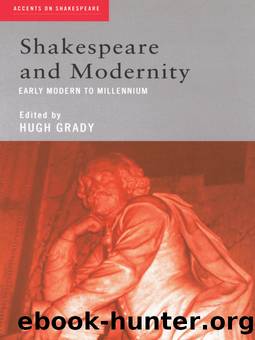Shakespeare and Modernity by Grady Hugh;

Author:Grady, Hugh;
Language: eng
Format: epub
Publisher: Routledge
Published: 2002-08-14T16:00:00+00:00
The pun’s yielding of an excess of meaning, a kind of return derived from the act of articulation, performs the process of interest-taking at the level of linguistic interaction; it is the ‘profit’ to be derived from discursive exchange, what Shell calls ‘verbal usury’. In this respect both the objective appellation Jew’ with its interactions released by a seminal pun, and the subjective appellation ‘Shylock’, the individualized ‘name’, untraceable in the discourse of typology, in one line of the two ‘authoritative’ printed texts of the play, might be said to perform an additional tension that arises from the actual process of reading. That tension may well be an articulation of the modern, an individualism in embryo, so to speak, a proleptic gesture towards a form of social organization that, as yet, may only be articulated within an existing religious and moral discourse. ‘Shylock’ is none other than a figure who represents the forces of economic production, whose very existence challenges radically existing relations. As ‘Iewe’ he is positioned, but as ‘Shylock’ he is the force of the new that threatens to bring chaos to the traditional, harmonious world of Venice.
We might also extend this logic to the complex naming associated with ‘Launcelot Gobbo’, or, to use Q1’s spellings ‘Launcelet Iobbe’ and ‘Clowne’. Only one text of The Merchant of Venice, F3 (1664) shortens the initial ‘Iobbe’ to ‘Job’ (p. 167), but even that text continues thereafter with the nonsensical speech prefix ‘Gobbo’. Shell (1982) argues that the initial encounter between Launcelet and Old Gobbo parodies the biblical scene in which Jacob dispossesses Esau by stealing his father’s blessing. But he also suggests that the references to Old Gobbo’s blindness and Launcelot’s hirsuitness extend the parody encounter with the biblical figures of Isaac and Esau respectively (Shell 1982: 52, 16). However, the spelling ‘Iobbe’ also echoes parodically the sufferings of the biblical Job which included, among other things, a plague of boils; the name ‘Launcelet’ begins to make a little more sense if we think of it in this biblical context also; he is the small lancet that will be able to alleviate his unfortunate father’s suffering, and he will do so by moving from the Old Testament to the New Testament, from a commitment to the house of the Jew Shylock, to that of the house of the Christian Antonio. The long tradition (with the exception of Capell (1768)) that has individualized ‘Launcelet Iobbe’, assumed the surname ‘Gobbo’ (which would obviate the need to use an italic cap I in the printing), and removed any direct reference to his function as ‘Clowne’ in the play, has also diminished the scope of the parody that this subplot affords. It is the theatrical self-consciousness liberated by the punning on these names that editorial tradition has methodically occluded, along with a complex debate about the nature of fiscal exchange. That debate centred on the subject of ‘usury’, its undesirability, its capacity to generate moral corruption, and its tendency to promote acquisitiveness, to privilege
Download
This site does not store any files on its server. We only index and link to content provided by other sites. Please contact the content providers to delete copyright contents if any and email us, we'll remove relevant links or contents immediately.
Love Your Life by Sophie Kinsella(1265)
Albion by Peter Ackroyd(1066)
The Hell of it All by Charlie Brooker(896)
How To Be A Woman by Caitlin Moran(865)
All in a Don's Day by Mary Beard(849)
Albion: The Origins of the English Imagination by Peter Ackroyd(829)
A Dictionary of Literary Symbols by Michael Ferber(798)
The Eye in the Triangle: An Interpretation of Aleister Crowley by Israel Regardie(767)
Protector by Conn Iggulden(761)
Dot Con by James Veitch(743)
English Literature: A Very Short Introduction by Jonathan Bate(713)
Less: Winner of the Pulitzer Prize for Fiction 2018 by Andrew Sean Greer(648)
English Literature: A Very Short Introduction (Very Short Introductions) by Bate Jonathan(601)
I, Partridge by Alan Partridge(591)
The Songbook of Benny Lament by Amy Harmon(587)
Katharine Parr, the Sixth Wife by Alison Weir(557)
Work! Consume! Die! by Boyle Frankie(551)
Mussolini: His Part in My Downfall by Spike Milligan(548)
The Cambridge Introduction to Jane Austen (Cambridge Introductions to Literature) by Janet Todd(538)
